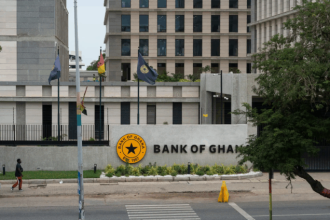Gifty Asante Prempeh, a maize vendor at the Alabar market, beckons potential customers to purchase her few kilos of maize in stock.
While she clamours for her goods to be sold, she is worried about how to restock. She has in the past few days struggled to access maize to restock.
“Maize isn’t available as of now. Even those that are on the market now are really expensive. For two weeks now, my container has been empty,” Gifty said.
She continued: “Some Nigeriennes and Burkinabés are really worrying us. After we’ve bought the maize and we are trying to look for more, the farmers will again sell to these foreigners who offer better prices than us”.
Maize vendors in the Ashanti Region are struggling to access the grain crop from farming communities as they compete with foreign nationals on the local market.
Despite the government’s ban on the exports of maize and other essential cereals, the traders claim farmers are selling off the commodity to vendors from neighboring Burkina Faso and Mali who offer better prices for the grain.
The ban came into force when the dry spell ravaged farms in eight regions of the country.
The situation has compelled vendors in the north, including foreign nationals, to move down south in search of the grain on local farms.
The scarcity of grain is pushing prices upward with a 50% price hike on the already scarce commodity.
“During the main harvest season, maize was selling at 600 cedis, it then moved to 00 cedis when the rains failed. But now, a sack of maize is selling at a minimum 1,000 cedis. Even with that, we aren’t getting some to buy,” Gifty worriedly said.
Maize, as a major staple crop in Ghana, is used for a variety of delicacies including porridge and swallows like banku and Kenkey.
The news team visited one of the Kenkey-making hubs here in Kumasi, specifically at the Oforikrom municipality of the Ashanti Region.
The business is the daily source of income for the women who inherited the trade from their foremothers. But the recent scarcity of the maize commodity is taking a toll on trade which the women rely on to fend for themselves and their families.
Rukayya Yusif has been in the Fante-Kenkey-making business for more than two decades.
“We aren’t getting some of the maize to buy. The ones that came sold at 1,200 cedis. It might even increase again. Just three days ago, someone came here for money but she said she couldn’t get some of the maize,” she said.
With the few bags of maize they’ve had in the past week, the women make balls of both Ga and Fante Kenkey out of them.
While Ga Kenkey has seen an increase from the initial five cedis to seven cedis in cost, Fante-Kenkey producers are contemplating increasing the price.
The vendors want to increase selling price from 3 cedis per ball to 5 cedis to make up for the high cost of maize and other ingredients.
In spite of the challenging times, the women are finding alternatives to supplement the few corn dough they make to stay in business.
“A company makes corn dough, sometimes we buy from them. But it’s not better off than you preparing it yourself,” Adwoa Mantsimah, a Kenkey vendor said.
Maize forms 50% of Ghana’s total cereal production and is the second-largest commodity crop after cocoa.
Back in the market, traders predict protracted maize shortages if the measures instituted by the government aren’t implemented well.
“There will be a huge shortage of maize on the market soon if the government doesn’t work expeditiously,” the traders added.
With the prevailing challenges befalling the sector, there are admonitions for an introduction of a competitive price purchasing regime to deal with the unrelenting habits of farmers exporting the cereals.
















